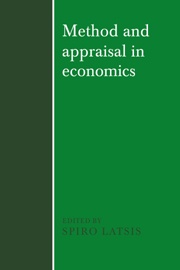Book contents
- Frontmatter
- Contents
- Preface
- A research programme in economics
- Economics and psychology: the death and resurrection of a research programme
- Schools, ‘revolutions’ and research programmes in economic theory
- Anomaly and the development of economics: the case of the Leontief paradox
- From substantive to procedural rationality
- Kuhn versus Lakatos or Paradigms versus research programmes in the history of economics
- On the history and philosophy of science and economics
- ‘Revolutions’ in economics
- Index
A research programme in economics
Published online by Cambridge University Press: 23 November 2009
- Frontmatter
- Contents
- Preface
- A research programme in economics
- Economics and psychology: the death and resurrection of a research programme
- Schools, ‘revolutions’ and research programmes in economic theory
- Anomaly and the development of economics: the case of the Leontief paradox
- From substantive to procedural rationality
- Kuhn versus Lakatos or Paradigms versus research programmes in the history of economics
- On the history and philosophy of science and economics
- ‘Revolutions’ in economics
- Index
Summary
Alternative methodologies of economics
A seemingly liberal adequacy requirement may be employed to test the applicability of any methodological framework to economic theory. That is, on the basis of the proposed methodological criteria, (i) not every putative economic theory should automatically qualify as economic science and (ii) not every economic theory whatever should be banished as pseudo-science.
Unless the first requirement is satisfied, the criteria would obviously be too lax: unless the second is satisfied they would equally obviously be too restrictive. Both extremes defeat their purpose, which is to organise and appraise some subject matter. The first extreme opens the floodgates of confusion while the second legislates the subject out of existence.
Yet most economists and methodologists would feel uncomfortable if these adequacy requirements were effectively imposed. And this is not surprising. Most methodological frameworks transplanted from the natural to the social sciences fail to fulfil even these minimal adequacy requirements when applied to economic theory. More specifically, where the subject matter is the history of economic theory, apriorism is too lax, while falsificationism is too restrictive.
My thesis will be that there is however, a comparatively new methodology, the methodology of scientific research programmes (MSRP), which fares better than any of the hitherto available methodologies of economics for the description and appraisal of developments in economic analysis.
- Type
- Chapter
- Information
- Method and Appraisal in Economics , pp. 1 - 42Publisher: Cambridge University PressPrint publication year: 1976
- 43
- Cited by

